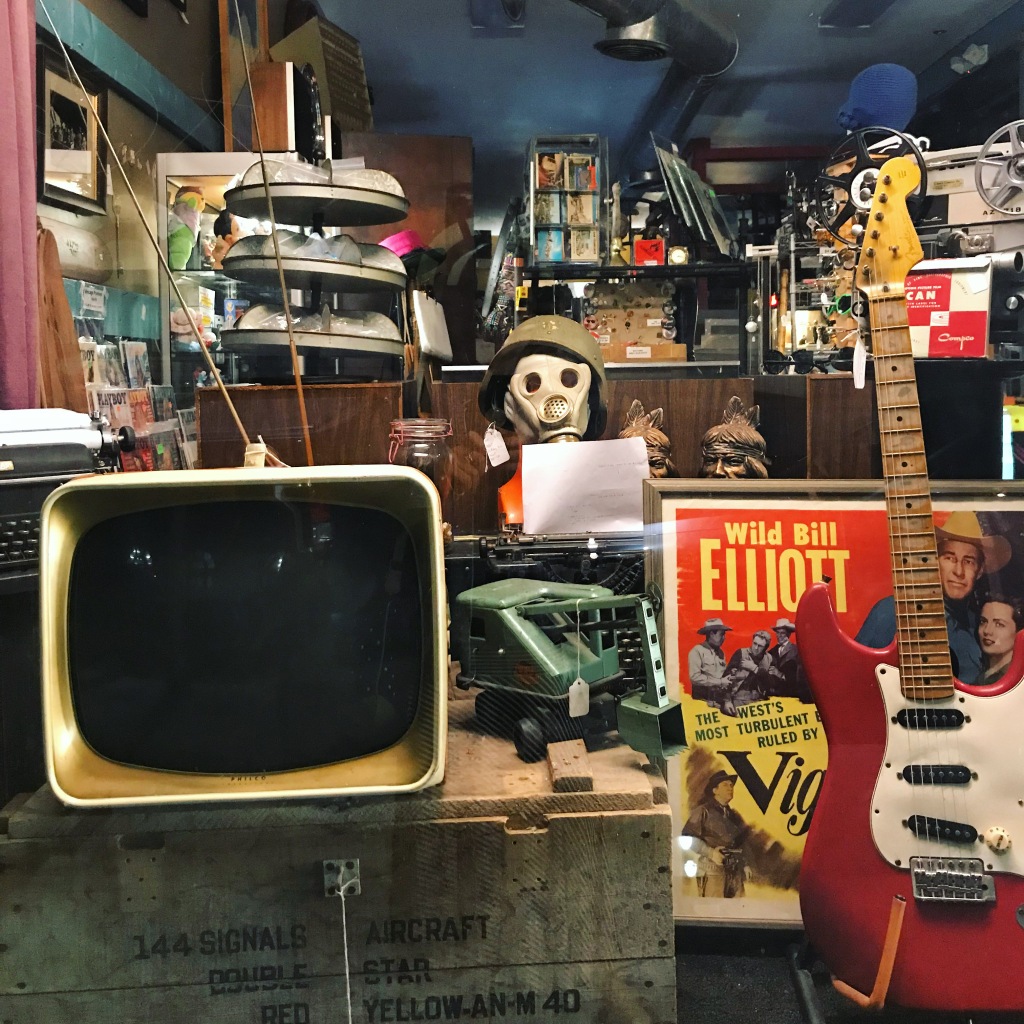How to Raise a Pet Raccoon
By Anna Tatelman
- Don’t adopt a wild raccoon. Even if your neighbor’s Rottweiler murders raccoon’s mother and siblings. Even if raccoon keens all night until you swaddle him up like the baby you never had.
- After failing step one, research. Ignore memory of ex-husband Derrick laughing, “Is a furry garbage can supposed to be some kind of baby-substitute?” Focus on encouraging messages from the raccoon owners you follow on Instagram.
- Bottle-feed several times daily. Don’t let raccoon overeat because it can cause serious health complications. You, on the other hand, should feel free to eat as many peanut butter cookies as you want now that Derrick can’t lecture you about developing cottage cheese thighs.
- After feedings, stimulate bladder. Yes, really. Your raccoon’s intestinal tract cannot yet function independently. Ignore friend who gags and says, “You know, most women just dye their hair.”
- Keep your baby coon warm. Hold him against your body, wrapped in a blanket, as often as possible. Wish that you hadn’t forgotten to pack your Sue Grafton novels when you left Derrick because you could be reading one right now and he wouldn’t be able to throw it across the room as he demands why you’re filling your head with anti-intellectual dribble.
- For the love of God, don’t name your raccoon Bandit. Allow him dignity. Like Edward, the name of your late grandfather. When your mother says, “Weren’t you saving that name for my first grandchild?” explain that from now on you are doing things because you want to, not because someone else does. Like staying married to a jerk because you’ve been told unhappy companionship is better than solitude. Or pretending to want a child when all you really want is an adorable raccoon. Don’t try to explain how, despite your refusal to give your raccoon the shitty name of Bandit, you’re also a fugitive from your life.
- Wean raccoon at seven weeks. Begin with moistened dog food, then round out diet with fruits and vegetables. Round out your own diet, while you’re at it. It’s time to stop subsisting on cookies just because you can. Treat yourself and Edward to said cookies only on special occasions.
- Devise daily enrichment activities for raccoon’s mind and body. Feel proud of Edward’s cleverness when he figures out how to zip open a lunch box with a cookie inside, not to mention impressed at his dexterity. Don’t let these observations spawn illegal ideas.
- Train your raccoon in basic commands such as responding to his name, using his litterbox, and picking the lock on your ex-husband’s front door. Forgive yourself when you neglect to train Edward in the art of not shredding Derrick’s sofa cushions or scratching his hardwood floors.
- When raccoon is sixteen weeks old, release back into wild. Don’t sit down with Edward in lap and L is for Lawless in hand. Definitely don’t revel in your shared victory with two peanut butter cookies.
LORD OF THE FLIES
By S.F. Wright
Gina was to work four hours a week, for 30 dollars an hour: collecting Justin Case’s assignments, going to his house to give him his work, helping him if he needed it.
It was decent money, even though, as a 17-year veteran chemistry teacher, Gina didn’t need it. But she lived alone, had no kids; she liked to keep busy.
Justin suffered from headaches. So he said. Gina wondered. But after bringing him assignments a couple of times and explaining them, she decided that she didn’t care. Justin was polite, appealingly self-conscious. Gina liked his mother, too, a preoccupied woman whose online business sold products such as organic shower gels. The house always smelled like violets and pine.
Justin’s English class was reading Lord of the Flies, which Gina had read when she was in high school. When Justin asked if she could read passages aloud to him, as he had a hard time concentrating, she was a tad surprised but agreed.
She’d read to him every time. She’d sit in a chair at the dining room table; Justin next to her, feigning trying to concentrate, or actually trying to concentrate; his mother in the next room, working on her computer. Gina read with an air professional yet slightly wry, as if to suggest that she was aware that she was being indulgent. One evening, Justin’s mother ordered Mexican food; it arrived as Gina was about to leave. As she packed her things, she hoped, even expected, that Justin’s mother, or Justin, would ask her to stay. Neither did.
Right before the end of the marking period, Gina received an email from the home instruction administrator, informing her that Justin would be returning to school; Gina no longer had to go to his house; she’d be assigned a new student.
The girl had broken her foot playing volleyball. She was polite (if a tad uncouth); yet Gina didn’t look forward to going to her house and working with her as she had looked forward to going to Justin’s house and working with Justin.
She kept an eye out for Justin, but the school was enormous; it was conceivable that they’d never see each other. But then one day, as Gina was leaving the teachers’ section in the cafeteria, she saw him sitting with a group of friends. She looked in his direction longer than felt natural; finally, he looked up. When she waved, she felt pathetically alone, not unlike how she’d always felt herself as a high school student. Justin looked surprised—but then waved and smiled back.
Walking out of the cafeteria, Gina liked him more than ever; and she told herself that she’d never bother him again.
tv kids
By Amy Scheiner
We were tv kids. Made of canned laughter and pixelated sunburns. We marched like a gang on the blacktop pavement, untied shoes and shaggy bangs, spitting lines from Friends and Family Matters, counting down the days till TGIF. One step ahead of the latch-key kids and one behind the iPhone generation. We knew we were all that and a bag of potato chips.
We were tv kids at home when mom and dad (but usually mom) came home from work, backs aching and eyes drooping, and said go watch tv, and when mom and dad or mom and someone fought, dropping F-bombs and “I hate yous” and said go watch tv, and when we dropped our shoulders and whined of boredom, and some adult somewhere said go watch tv. Pretty soon we got so good at listening that we stopped getting in the way and just watched tv.
Home sick, snow days, no days with the Price is Right, greedy dollar signs magnets between us and the set. Maury with women-whores and lucky-not-daddys and Jerry Springer with hair-pulling and fist-punching, all that blood lust. We knew it well.
At recess, we tv kids would clutch on the chain-link fencing, chain-smoking with pretzel sticks, and jab each other over who got to be Baby Spice and if Joey would end up with Dawson. The adults called us growing pains.
When they rolled out the tv cart on a rainy day, like a golden calf, we picked our heads up off the laminated desktop and raised our hands in hallelujah. This was the only time we’d stay awake. This was the only time the teacher drifted her scornful glare to some unlucky kid with his head in a book instead of on the screen.
We tv kids lay on someone’s couchbedfloor, legs over legs, skulls on backs, and lick our Cheeto-fingers, laughing and laughing and laughing at god knows what. Our laughing felt so good we thought we’d never feel this good again.
At some point in our no-blinking screenathons, after hours of feeling—hearts wrenching when Will reunited with his father after 14 years, our sex budding when Buffy and Angel finally kissed under the streaming sun—someone’s grandpa or grandma hacked on a cigarette, gravel-voiced and agitated and yelled, Hey kid, you seen the sun today?
A Liberal Pour
By Jessica McGlyn
I was sitting amongst the dunes on Cannon Beach. It was a brilliant cerulean day, but the bitter north wind was blowing with such ferocity. That was how it was on the Oregon coast, a perfect summer day ruined by the wind. Being from Florida, I could never accept that in the middle of summer, on a sepia beach, with heavy jade waves rolling over smooth stones and broken shells, one could freeze.
And dear Joe had left me with the wine we’d purchased from a nearby vineyard. He’d left me with the bottles, red, white, and pink (yes, that was the level of our sophistication back then) and taken off down the beach. He had wanted to go on a romantic stroll, to collect sea glass and hold hands, but I’d decided instead to sit alone in the grassy dunes. Because I was lazy and comfortable. And to be honest, I just didn’t want to go. For I’d been fighting a feeling that had been festering for months, the feeling that he, this, was all too damn easy. I was thinking, as dumb as it might sound now, that great love must be born of struggle, that real love must be wrangled. I was deciding, that despite his kindness, his goodness, I must end it.
And I sat there in the dunes on top a meager towel, my arms pulled into my sweatshirt, my eyes covered by the hoodie, bracing myself. Because he was a fine man that in no way deserved what I knew I had to do. And because in between blasts of wind, believe it or not, it was sweltering under that sun, almost so you’d want to throw off all your clothes, slather up in coconut oil, and bask. But only for a moment, in between the jerking gusts. Which made the day all the more cruel.
So, I don’t know if I was bracing myself against the warmth or the cold or my heart, but it was tense, all the same. I sat there, balled up, rocking back and forth like a little wooden horse, wondering, “how can it be that it’s July, yet I am so cold?” digging my feet under the sand and thinking that God would hear me, would notice I was right. Yes, I was thinking it was my duty to protest the injustice of the north wind. That my complaints were righteous prayers.
And then I opened the bottle that didn’t need a corkscrew, the pink one (rosé, I’ve come to learn) and poured a glass to keep warm, to forget Joe, and also because I was angry at the wind. Besides, he’d left the bottles and plastic cups with me, so why not? The sky was so sharp in its cloudlessness, that I remember. How could it be, not one cloud, neither nimbus nor cirrus nor cumulus, when all sorts of clouds are just about everywhere, all the time? I was thinking, I am starting to feel better with the wine, or at least it doesn’t matter that my fingers and toes have gone numb, even though it’s July and none of this is fair.
So, I drank one more glass. It was summer after all, and summers are made for drinking pink wine as you sweat on a lazy, empty beach. The bottle was half empty. (Ha! I guess I’ve always been a pessimist.) And Joe was nowhere I could see, though I confess, I only gave the beach a quick scan. What I mean to say is, I didn’t try that hard to find him.
The wine made me feel as though I hadn’t wasted half the day, shivering, whining, cowering in the dune like some beaten down crab. And I wanted to feel a little better, or at least not so angry at the wind, at myself. Because it was summer, and summer is meant for celebration. So, I drank one more glass of the pink. And, oh man, did I feel good. My limbs hung loose at my sides, like fresh linguini, and I looked straight up, thinking if I squinted, I could squish the sun into a million cuts of sapphire, topaz, some other yellow gem, though the sun is in no way yellow, not at all, not when you look straight into it, but all the same it sparkled. Oh man, did it sparkle.
And I stopped caring for a minute about what a fucking rip-off the north wind had made of my perfect summer day. And I stopped pretending that this urge to leave good, kind Joe would pass. And I stopped praying for the wind to stop, as I was flat out in the sand, and it was all blowing above me, and yet I was okay. In short, I was letting go.
By now, the bottle was near empty. I had a liberal pour. And maybe I should not have been so surprised when Joe returned from his stroll, when he picked up the bottle and said “thanks a lot” as he dropped a handful of sea glass on the towel. He’d said it not with his usual warmth I had become so inured to. He said it the way God must sound like when summoning up that north wind.
And by now the wine was coursing through my every vein and organ, caressing me through and through. And I picked up the bottle straight to my lips, finishing off the last pink drops. And I said, “you’re welcome,” thinking that this might be a different kind of summer. I was thinking, for the first time, that maybe everything is as it should be, that maybe no one is to blame.
Mack
By Bill Gottlieb
Just shut up. That’s the best advice you’ll ever get if you feel the need to explain yourself. People will believe their first impressions, and if you admit to doing anything wrong, you’re guilty, no matter what you say. But what I did with Babs and Pencil Neck requires explanation.
Babs lives in a double-wide in a trailer park in Richmond. Each trailer’s got an electricity, water and sewage hook-up poking out of the blacktop. Stairs pull down from the door to the ground. Nothing there expended for beautification. But if you look at it with the right eyes, it’s got a stark beauty of its own, the twinkling Chevron oil refinery in the background with fires burning off natural gas byproduct.
Here I am, in the parking lot, in sight of her trailer. The lights are on in there. She’s out, but you can see the asshole’s head bobbing up and down to the music through the uncurtained part of the windows.
I should be angry at Babs. Babs of the very long fine brown hair, playing folk guitar and singing with it, and living on the Outside. We’re not talking here Bryn Mawr degrees, or activities undertaken for the benefit of the community, or New Age spirit. Babs is a barmaid at a blues club and has picked up and been picked up by people with rough edges. I was one of them, an habitue of the club. Income derived from occasional drug sales, re-purposing stolen articles and, my claim to fame, buying and selling handguns, one of which I carry myself. There’s no nice guy struggling to get out of me and I thought Babs got a thrill out of the whole thing.
There’s a calculus that goes into what you can expect from a girlfriend. Babs was living in the double-wide. I had my own rented room in El Cerrito. I wasn’t living with her and I wasn’t contributing to her support. But we were having sex and getting high and going out to some high-end spots with my customers.
So I think it’s fair to say that she strayed when she started entertaining this young man in her trailer. They met when he bought an ounce of weed from me and she happened to be there. He was thin as a pencil, a lot of curly hair, inch thick lenses on his glasses. A hippie intellectual, book in hand.
I bet none of you ever admitted to being a bully. It’s a role disfavored by decent people. And you don’t even get tough-guy credit for it. That is, you intimidate people and they hate you. But in the tea parties of the intimidated, they say you’re really a coward—your bravado is false, and you’re weaker than they are. Which only makes messaging that much more difficult.
I hadn’t seen or spoken to Babs for weeks but she must have known it was me when I slashed the front tires of Pencil Neck’s pick-up truck. Whatever she said to him about it, he kept coming back night after night. The next week I slashed all four of his tires. Now, I imagined, Babs must be scared, anticipating my next move. I hoped I was getting into his head too.
Then—my phone rings and there’s a distantly familiar voice on the line. “Mack,” the voice says, “Babs and I love each other. Leave us alone.” There’s a pause and before I can come up with something to say, click, he hangs up.
I should respond to his call by putting a couple of rounds into the trailer while he’s there, somewhere toward the front end so he wouldn’t get hit. But for once I can’t play the bully. I don’t know if they really love each other, him and Babs, but Pencil Neck’s made his claim. He’s a guy who won’t be pushed around.
Allison Hardwire
By Jordyn Damato
Allison Hardwire was a dedicated singer, songwriter, actress, model, and cheerleader, when she was 13 years old.
Allison Hardwire was a dedicated singer, though people often left when it was her turn to karaoke and she would belt, or scream, more accurately, the lyrics to Call Me Maybe by Carley Rae Jepson. Allison stopped singing when she looked up at the end of her set and the only faces she could see were her own in the reflection in the café window, and the DJ who was picking food out of his teeth with his AirPods shoved dangerously deep into his ears. Allison walked the one block home, opened her diary, and vowed to herself she would never sing again.
Allison Hardwire was a dedicated songwriter after she realized she couldn’t sing well enough to keep a crowd. She didn’t take this news lightly, her lack of talent, as no one told her directly. It was her friends leaving the karaoke café with no goodbye, it was them ignoring her at school the next day, and the day after that, when she realized it was because she was bad. It was the DJ’s apparent frown when she walked in every Thursday at six o’clock on the dot. It was the silence after the music faded out. It was her diary that was there for her when she dealt with her own inadequacy, and it was the songs she wrote that stopped her from letting the voices inside her head win.
Allison Hardwire was a dedicated actress when she brought her diary to school one day, wrote in it during class, and got in trouble for not paying attention in math. When Mr. Moltrop confiscated her diary, he threatened to read it aloud. Allison put on her best good girl voice and pleaded for him not to, she insisted she was sorry and would never make the mistake again. Because of her convincing performance, Mr. Moltrop let it slide. It wasn’t until a week later where she was caught again, and Mr. Moltrop read some of her lyrics to the class.
To you, I am more than through Because of you, I am permanently blue Where are you, where are youuu To you, I am weak and mute Because of you, I bleed and bruise Where are you, where are youuu Come back soon, maybe I need you I need you, I don't want to, I do Where are you, where are you?
The class laughed and laughed. Allison acted like she didn’t care. Mr. Moltrop asked if she learned her lesson; she acted like she cared. Later that evening, Allison’s mom asked how her day was and Allison thought about her whole grade asking her, where are you? Where are you? Every chance they got. Allison acted like she had a good day, had good friends, a good life. Her mom should’ve given her an Oscar.
Allsion Hardwire was a dedicated model when she reached seventh grade and thought people would like her more if she was pretty. The internet told her the truth about blondes having more fun, so she bleached her black hair. She didn’t think about her black eyebrows when she saw her newly yellow head, so she bleached her eyebrows. She didn’t think about the bleach dripping down until she screamed crying to her mother, who held her thrashing body as she shoved Allison’s face under their kitchen sink.
Allison Hardwire was a dedicated cheerleader (at try-outs) for 15 minutes before one of the girls, her old karaoke friend, asked if she thought she could manage to squeeze in the uniform. Allison answered Yes! Why?! Thinking she was finally being seen as an equal, until the gang of girls burst into hysterics and agreed in unison, Yeah, right.
Allison Hardwire was a beloved daughter and (occasional) friend. Allison Hardwire committed suicide on Thursday, April 17th, 2017 and was pronounced dead at 6:02 pm. Allison Hardwire will be missed by her mother.
Champion
By David Thomas Peacock
Kiko was going to miss coming to this place. Enveloped by the quiet, she’d watch him sleep, imagining the possible futures they might share. Today was different. Legs fidgeting, she parted cracked lips painted in cheap magenta and moved in to nibble a truncated nail. The tip of her finger was stained rusty brown, like it had been held too close to a flame. Goddamn rock, she thought. Nasty. Under her bony ass it went.
Outside, the ever-present sound of honking horns mixed with the high-pitched squealing of children on their way home from school. The neighborhood’s racket was audible but muffled through the sheltering walls of this sacred space.
3:20 in the afternoon. Fucking clocks, always telling you what time it is, reminding you you’ve got nowhere to go. In the room’s coolness, a sticky film of city grit and sweat had dried to a glaze of iridescent funk on her copper skin. Working girls in the heat smelled the same everywhere, acrid and sweet — the pheromones of sex laced with cigarettes had their own allure, at least if that’s what you were looking for. She’d been strolling Broadway when her beeper went off.
Come now. J.
Yeah, this place was safe, alright. Might be the only safe place she’d ever been, a sanctuary from the streets. Digger would come looking soon enough, but for now, all was peaceful — just the two of them, hushed and alone. A furtive scan of the room confirmed the coast was clear. Kiko pulled her hands out from the hard crush of ischium that felt like rebar grinding into her fingers. Digger always sayin’ I have a flat ass. Fuck him.
Intricate patterns left behind by long-forgotten lives covered the floor like secret hieroglyphs. This building was over a hundred years old, always a fortress of healing for the city’s poor.
God bless the child.
It’s funny the things that pop into our minds. Billie Holiday’s fragile voice echoed, uninvited, conjuring memories of Sunday afternoons spent at her grandma’s years ago. Even as a little girl, she understood what the words meant. Outside, activity bustled, but in here, it was suffocating as a tomb. Marquis lay a few feet away, sprung from his incubator, looking peaceful in the sunlight streaming through the wooden blinds. Wrapped up tight. Papoosed.
Airline pilot.
That was a favorite. Captain Champion. Together, they would fly away to the far corners of the world, laughing and hugging the way people do, discovering foreign cultures that, in the end, weren’t as different from each other as you might think. He’d have on a pilot’s uniform and cap, and when they’d walk through the terminal, people would smile and nod out of respect.
Kiko had never been to an airport, never even sat on a plane. Still, it was a pleasant dream. Seemed possible, at least for a moment.
The traffic outside sounded like it was getting farther away. That’s strange.
A steady beep emanated from somewhere; she couldn’t place the location.
Doctor!
She could hear it now; his name paged overhead with urgency.
Doctor Champion. Oh, now we’re talking. People used to think she’d made up her last name, but it really was Champion. What was the origin? Who the fuck knows? No one in her family ever stuck around long enough to tell her. All she knew was her name was Kiko Champion.
Champion of nothing.
Her face hardened, then went soft. Marquis, on the other hand, was another matter entirely. Marquis Taiwan Champion. Now that was a fucking name. With a name like that, he was bound to go somewhere far away from this shithole of a neighborhood. No doubt he could be a doctor if he wanted. Maybe help mothers with sick babies. Why not?
Three days after he was born she saw a picture of Taiwan in a beer ad at the Chinese take-out on St. Nicholas. A sign. Miss J said there wasn’t any rush to name the baby, but Kiko didn’t like seeing a number on his incubator. Running to the NICU, she didn’t bother picking up Digger’s moo shu pork. Fuck Digger. The nurses all said it was a great name, and she watched through the window as they taped it to the side of his isolette. Twenty-six weeks. He was a tiny brown bean with a knit cap on his head, never touched by the warm flesh of another human. Never held by his mother. Too fragile. No immunity, the doctor said. Kiko wasn’t sure what that meant, but it didn’t sound good.
Crack baby. Marquis’s sickness was all her fault. Stupid crackhead ho. No one needed to tell her what everyone already knew.
She wanted to die.
For almost a month, Kiko would come here when she could. Not every day though. A short stint in Rikers and time lost chasing rock kept her away, but she never stopped thinking about him. Whenever she showed up, Miss J was never mean, even though she deserved it. She’d watch him through the nursery window; the nurses looked like astronauts wearing spacesuits to protect the babies. Planet crack baby. Everyone was safe here. This was where the babies grew strong enough to go home. Kiko didn’t have a home, but she was gonna make one for Marquis. Clean up like a real mother.
The door opened, startling her.
“You OK in here?”
Miss J’s head peeked in, blue eyes coruscating, a stethoscope hanging around her neck like medical jewelry. Even in her scrubs, Kiko thought she looked like a movie star.
Ashamed, she stared down; the scratches on the floor seemed to be a puzzle she couldn’t solve.
“Do I have to leave?”
Miss J walked in and sat next to her.
“You can stay as long as you want.”
Their hands touched, the nurse’s flawless mocha skin wrapped around Kiko’s reddish brown fingers, stained with the pain of a life without hope.
“He was a beautiful baby.”
Kiko began to cry.
That Girl With an Ankle Tattoo
By Dan Morrison
That looks like Nora. Well, at least that’s kind of what she looked like. It’s been a long time. She had to go out and live with her father for a while. I wonder if she’ll be back for a while now or if she’ll be gone again soon.
“Who?”
That girl over there, with long brown hair. She has a sundress on, an ankle tattoo, and AirPods. She’s wearing a smile that I don’t remember. Almost like she’s happy now. She would never have worn it then. Things must be good with her dad now, or maybe it’s good they’re done.
“She seems like she’s doing fine.”
Most people seem like they’re doing fine. A lot of people make out like they’re fine even though they’re not. Putting on a good face isn’t too tough—even when you’re not.
Back in middle school, her parents called it quits. She was out for a little while and then back in. She was out for stretches, every now and then, before that too but this was different. Sometimes she’d cry but say nothing was wrong. Of course, she’s not the only one. That’s when her dad moved away. Found some girl half her mom’s age and bought himself a convertible Sebring.
I didn’t think about her much then. I’d never been with a girl. Heaven was still playing a pick-up game. A little later she went to a new school, but we met up again in high school. We had a couple classes together and were friendly enough to say, ‘Hi, how’s your life?’
She caught my eye, but I wasn’t ready to say more than ‘Hi, how’s your life?’ Others were, though. That didn’t especially matter to me. I had tryouts. I had the school paper. I had my own life and everything that goes along with that. Besides, she was nice, but she was just another girl. A lot of them catch your eye then.
A guy I was kind of friends with dated her for a while. We ended up at a party one night. She wasn’t there. I was talking to a friend of a friend, drunk on something called Long Drink that I’d stolen from my mom. The guy she was with came over to us with his phone out. He was there for the other guy. I just happened to be around. He’d finally convinced her to send a couple naked photos to him. He wouldn’t show his friends. I remember wondering why he showed us. Then I wondered if I would do it too.
She didn’t know that, though. So, it probably would never hurt her. It didn’t seem like it did until things went wrong between them. Then were the tears. Then he AirDropped the pictures in school. We never saw her again. He was back in school a couple weeks later.
That’s all I know for sure. I heard some rumors too. Someone said she was in the hospital. That she’d taken some pills–or was it that she’d used a knife? That’s when she moved out to some relative’s house. It was still weird with her dad. Her stepmom wasn’t bad but it’s still tough. I suppose she couldn’t be here and didn’t want to be there for some reason.
“Where’d she move?”
A town over. The end of the world. I don’t know. It doesn’t matter where someone is if you don’t see them. She was out of sight, so she was out of mind. It was one of those kinds of things. Things must have gotten better. Maybe they didn’t.
“You haven’t seen her since school?”
For a while no one did. A couple of the girls said they would every now and again. There was never much to it. They’d say she’d lost the plot. I still remember this one girl, I didn’t like her much, say she was looking rough. Something was wrong. Something was gone. She was looking so thin and there was nothing to her eyes.
She was in the liquor store once. I got close enough to see she’d stopped wearing her old lip gloss. But I ducked into another row. I wasn’t much back then and she wouldn’t have wanted anything to do with me. It was easier that way. She looked haunted by her shadow and cheap cigarettes. I thought about what she looked like in those pictures, even then.
“Are you gonna say something now?”
What’s there to say? Nothing now. Nothing new. It’s too late now, anyway …
“Too late for what?”
It doesn’t matter. Look. She’s gone. Nora’s gone. I wonder when I’ll see her again. I hope I’m not the same as him.
Eternal Spring
By Alejandro Gonzales
Above all else, I noticed flowers bloomed with every step Emma took from the moment she found herself resurrected. They created a citrus-scented trail everywhere she went, and so I thought all was well. Maybe it had been for the first day or two.
We slept together in my bed until I noticed she did not smell nearly as pleasant as the flowers she created; though I would have vehemently denied as much at the time, she smelled like rotten, maggot-infested meat. She agreed to sleep in the guest room without saying a single word.
In fact, she never spoke at all. She nodded, grunted, shook her head, smiled, frowned, but I never heard a single intelligible word after her death and subsequent revival.
Flesh began falling off her like a dog might shed a heavy coat. I never acknowledged how ill the sight made me, or at least not when she was around. Still the flowers bloomed, smelling pleasant as ever.
She refused to eat anything, merely pointing at her stomach with a pained expression whenever I suggested she join me at the dinner table—or, rather, eat from a distance. Same story with drinks.
And though we watched television together, I could tell she was not truly there. It may not even be accurate to say her mind wandered. I’m just not sure she had a mind in any meaningful sense. The flowers which trailed her grew and grew, bloomed with each step, however there was more life in the smallest plant’s smallest petal than she could have exhibited in a million lifetimes at that rate.
When it became too much to bear, I let go. I gave her permission to sleep once more, and to this day flowers bloom on her grave and those nearest. Sometimes I pluck one to take home, delighted when another grows in its stead.
Instructions for Assembling the Enclosed
By Paul Beckman
First, you count the pieces. There should be 116, so if there is not, count again. Count a third time for accuracy and if all three counts are different email us at assemblyinstructions.com and explain the problem, tell how many times you counted and ask for a return label and a new box of Enclosed for Assembly with Instructions.
We will next send you an email direction for you to throw out the bad Instructions for Assembling the Enclosed and we will overnight a new Enclosed with Instructions for Assembly. This time there will be 121 pieces and you should follow step #1. Again, count three times for accuracy and if there are fewer than 121 pieces send us an email swearing that you know how to count and have graduated from high school.
Upon receiving your email telling us how many pieces are missing we will overnight you the missing pieces in the form of 3 pieces of balsa wood, two cutting and one shaping knife, and a 64 box of Crayola Crayons to match the blanks with the assembled.
If this is not to be a satisfactory solution send everything back and we will refund your money minus a 20% restocking charge and a 10% charge for checking your count. The returned money will arrive within 90 days unless we find that your counting was mistaken and or the Crayola Crayons are damaged in any way. Should that be the case we will add an additional charge of 25% for recounting and restocking and send you a gift certificate for the balance that must be used within 30 days of receipt on any of our fine products.
Enclosed for your rating of your Instructions for Assembling the Enclosed is a three-part form. You will notice that there are only 5 stars on each of the forms: one for the product Instructions for Assembling the Enclosed, one for the reliability of returning a defective product, and one for ease of assembling the product using Instructions for Assembling the Enclosed.
We thank you for filling out the form and to show our appreciation we are enclosing a 5% gift certificate for any of our other fine products. (This enclosed 5% gift certificate may not be combined with any other of our generous allowances).









